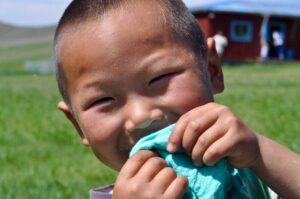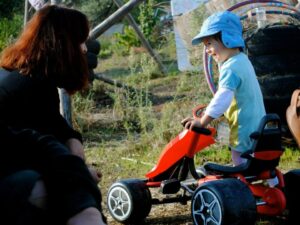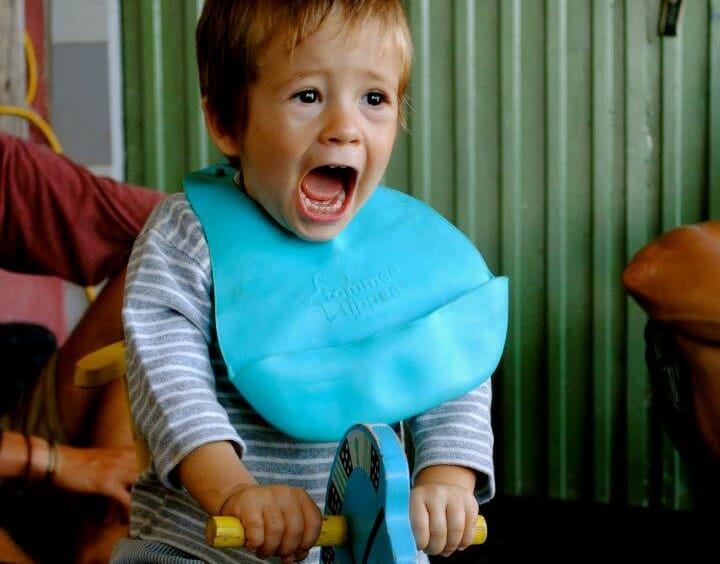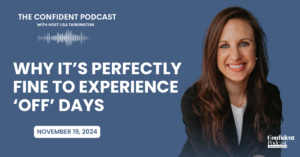6 Ways Acting like a Two-Year-Old can Help You Live Authentically
If you’ve ever spent quality time with little children, you know that they behave differently from adults in some very important ways. As tiny humans, we are born with instincts to play, laugh, cry, be silly, love, be creative, and all sorts of great things. Unfortunately, growing up often comes with an avalanche of rules and societal pressures that dim our childlike spirit and force us into a box that tells us what is and isn’t “appropriate” behavior. While some of these expectations are important to learn, like being kind to one another and not running out into the street, many of them seem to have no logical basis other than they make us feel ashamed and to conform to what is considered “normal”.
As adults, we tend to think we’ve got it all figured out, that we are better off the older and wiser we become, but I think we could all improve our lives by acting more like kids from time to time. As adults, there is a lot of responsibility. At times, we start questioning the meaning of life and the importance of our existence (check out sites like https://www.knowledgeformen.com/overcome-an-existential-crisis/ for more information on how to overcome this), which can be a lot for one person to think about.
While being a kid certainly comes with its own challenges, here are just a few of the things that are great about life when you are two years old:
1. They are comfortable with their bodies and bodily functions.
Kids are body positive! They think bodies are funny, which they are! They run around topless, they laugh when they burp or fart, they make grand announcements when they need to poop. Children have not yet learned to be ashamed of their bodies, to feel guilty about completely natural bodily functions, to judge themselves and each other based on weight, shape, size, color. And they are creative in the ways that they use their bodies – they are constantly experimenting and pushing their limits, figuring out how fast they can run, how high they can climb, how small of a space they can fit into.
2. They don’t mind staring at people or making prolonged eye contact
 Have you ever stared at a baby who is staring back at you and then they suddenly begin to smile at you? You can’t help but smile back as, for just a moment, you become lost in the pure and simple joy that children feel when they recognize that another person is connecting with them. As humans, we are wired to recognize and connect with faces at a very early age. Yet as we grow older, we learn that it is for some reason impolite to stare, to make prolonged eye contact – it is seen as either ogling someone or being creepy. But it is in our nature to be curious about others, to be drawn to interesting faces, to want to connect with people we see walking down the street. Why is it that staring makes us so uncomfortable as adults when it is so natural to us as children? And as adults, why do we feel comfortable staring at babies but not at other people our age.
Have you ever stared at a baby who is staring back at you and then they suddenly begin to smile at you? You can’t help but smile back as, for just a moment, you become lost in the pure and simple joy that children feel when they recognize that another person is connecting with them. As humans, we are wired to recognize and connect with faces at a very early age. Yet as we grow older, we learn that it is for some reason impolite to stare, to make prolonged eye contact – it is seen as either ogling someone or being creepy. But it is in our nature to be curious about others, to be drawn to interesting faces, to want to connect with people we see walking down the street. Why is it that staring makes us so uncomfortable as adults when it is so natural to us as children? And as adults, why do we feel comfortable staring at babies but not at other people our age.
3. They dance when they want to and spend their days playing
Remember when playing with your friends was a perfectly acceptable way to spend the entire day? When all you needed was a cape and your imagination to entertain yourself for hours? One of my favorite quotes is “We don’t stop playing because we grow old, we grow old because we stop playing”. As we grow up, we learn that play is frivolous, it’s irresponsible, it’s childish. We stop playing as much because it is not viewed as important, when in fact play has all sorts of health benefits including reduced stress, a better relationship, and increased productivity. There are so many ways for adults to play too. It doesn’t have to be childish. For example, some people could consider playing computer games. That’s something that younger people do, so why can’t adults? There are some websites that even have classic games that adults probably would’ve played when they were younger too, like this fire emblem gba rom. Hopefully, those games could reduce stress.
4. They express their emotions openly and honestly, no matter where they are or who else is present
 When a two-year-old is tired and hungry and just can’t even, they have a meltdown right there in the middle of the grocery store, or restaurant, or theme park. They don’t hold their feelings in and wait until nobody can see them cry, or try to pretend like everything is ok when it clearly isn’t. As we grow up, we learn that it is not appropriate to show our emotions in front of others. We become automatic at answering “How are you?” with a template like “I’m doing well, thanks, how are you?” when there is often much more we’d like to say, but nobody is really prepared for an honest response to that question. We learn to hide not only our emotions, but our authentic selves from both strangers and the people closest to us, which makes it pretty difficult to live a meaningful and fulfilling life.
When a two-year-old is tired and hungry and just can’t even, they have a meltdown right there in the middle of the grocery store, or restaurant, or theme park. They don’t hold their feelings in and wait until nobody can see them cry, or try to pretend like everything is ok when it clearly isn’t. As we grow up, we learn that it is not appropriate to show our emotions in front of others. We become automatic at answering “How are you?” with a template like “I’m doing well, thanks, how are you?” when there is often much more we’d like to say, but nobody is really prepared for an honest response to that question. We learn to hide not only our emotions, but our authentic selves from both strangers and the people closest to us, which makes it pretty difficult to live a meaningful and fulfilling life.
5. They think they are good at everything
If you go into a classroom of kindergarteners and ask them who is good at singing, pretty much every hand will immediately go up. Try that in a classroom of high schoolers and you’re likely to only get one or two kids who are willing to admit that they think they are good at singing. When we are little, we believe we can do anything and we don’t worry about whether or not we can make money with these skills or do them “professionally”. But as we grow up, we learn that it is boastful to say you are good at something, that you shouldn’t call yourself a writer, a dancer, or an artist unless it is your career. We learn that being humble is a virtue and even when someone compliments us, many of us simply brush it off or automatically respond with a reason why we aren’t actually that great
6. They are curious and love to learn
 When we are young, everything is new, everything is a learning experience. We are constantly learning new words, skills, and activities. Our world grows bigger and bigger as we travel further from our homes, as we make new friends, visit new places. At some point, we seem to lose that curiosity. It becomes harder and harder to be impressed, to get excited about new things, to feel curious and to indulge that curiosity. We have to have a reason for doing things, rather than the simple joy of exploration and experiencing something different. We get set in our routines and become used to the world around us and are no longer so easily impressed. Albert Einstein said “The important thing is not to stop questioning. Curiosity has its own reason for existing”. Kids seem to know this a lot better than adults do.
When we are young, everything is new, everything is a learning experience. We are constantly learning new words, skills, and activities. Our world grows bigger and bigger as we travel further from our homes, as we make new friends, visit new places. At some point, we seem to lose that curiosity. It becomes harder and harder to be impressed, to get excited about new things, to feel curious and to indulge that curiosity. We have to have a reason for doing things, rather than the simple joy of exploration and experiencing something different. We get set in our routines and become used to the world around us and are no longer so easily impressed. Albert Einstein said “The important thing is not to stop questioning. Curiosity has its own reason for existing”. Kids seem to know this a lot better than adults do.
On my right arm, I have a tattoo of a fox, a character from the book “The Little Prince”. If you have never had the pleasure of encountering this book, I highly recommend you spend your next free afternoon reading it from cover to cover. It is a very sweet story that explores the differences between how children and adults see the world. The narrator apologizes for his simplistic drawings in the book, which he blames on being discouraged from being an artist as a child. He was told by adults to focus on more practical subjects, such as math and science.
For me, this book captures perfectly how sad it is that we lose so much of our wonder, curiosity, and enjoyment of simple pleasures as we grow older and are taught by adults what we should think of as important in life. What can do today to be more like a two-year-old? How can you laugh, cry, play, dance, stare, run, explore, question, and connect more with those around you? The next time you have the chance to interact with a little kid, take some time to really observe them and see what lessons you can learn from the way they experience the world. You might just find you have more to gain from them than you think!
Olive Ryan is a traveler, educator, blogger, photographer, lover of glitter and acro yoga enthusiast! Although her hometown is Portland, Oregon, she has lived in and explored many corners of the world and looks forward to spending the rest of her life doing so. Find more of her writing, music, and photography on her travel and wellness blog, oliveabroad.com.





